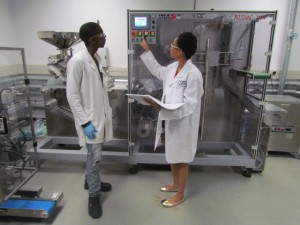
Leshego Ledwaba presenting an overview to Siyabonga Xaba on Operator Interface Parameters of the Blister Machine
The CSIR Biomanufacturing Industry Development Centre (BIDC) programme provides process and product development, process optimisation, scale-up, regulatory support and commercial manufacturing services for Small, Medium and Micro Enterprises (SMME) in the Biomanufacturing sector to enable the development of a vibrant and sustainable bioeconomy in South Africa and throughout the African continent.
The arrival of new formulation equipment (tablet press, blister pack and sachet pack machines will go a long way in fulfilling the BIDC’s mission of translating biotechnology research and development into market ready products.
According to Leshego Ledwaba, Candidate Process Engineer at the CSIR: “This project aims to develop biomanufacturing facilities with leading capability to advance prototyping and scale-up phases of innovative biotechnology products that SMME’s want to introduce to the market.”
“A core part of every manufacturing facility, whether at pilot or large-scale, is packaging. One might develop an effective product that can be a great solution to an existing problem. However, if the efficacy of that product cannot be sustainable throughout the distribution network or value chain from supplier to end-user, then that product will lose its value; and consequently be rejected by the market,” elucidated Leshego.
“Appropriate formulation of final product and good packaging capability allows the BIDC to provide commercial manufacturing services that are on par with market standards; thus increasing chances of market acceptance for new biotechnology products championed by SMME’s. The penetration and growth of SMME’s into their target market is a means to stimulate the growth of a biomanufacturing-based economy in South Africa,” she concluded.
Equipment overview
Tablet press machine – The Korsch XP1 single punch tablet press offers a comprehensive data acquisition and analysis capability, which advances product development with minimum raw material quantities. When a formulation is finalized, pilot scale production can be achieved. The tablet press design permits the highest level of Good Manufacturing Practice (GMP). GMP guidelines ensure that products are consistently produced and controlled according to quality standards. Tablet presses are typically used by pharmaceutical companies.
Blister pack machine – offers a continuous packaging process comprising of four stages viz. cavity forming, tablet/capsule filling, blister sealing and punching. Pressure and heat are used to transform a polyvinyl chloride (PVC) plastic sheet into a web of cavities/pockets suited to fit tablets/capsules. The formed PVC web is then conveyed to a filling station where tablets/capsules are inserted into the pockets. Thereafter, aluminium foil is used to seal the blister web. The web is then punched and cut into individual blisters. The machine provides a fully automated process at the push of a button. Pilot production of tablets or capsules can be packaged in this manner.
Stick pack machine – is commonly used in the packaging industry for food, and other convenience products. The machine constructs sachet sticks of various sizes out of flat roll of plastic laminate film, while simultaneously filling the sachet sticks with product and sealing the filled sachet sticks.
By Kulani Chauke
